Humane Homicide
“How often, when a fire breaks out, do you hear the words: ‘Thank God, now people have something to do again.’ I know a good remedy. You set fire to a city, you set fire to the empire, and everything swims in money and prosperity. Make furniture that you can burn down after three years because you can’t even get a tenth of the production price at the auction house, and so we’ll get richer and richer!”[1]
This outspoken program of destruction comes from Adolf Loos (born 1870), one of the pioneers of modern architecture:[2]
“Loos may claim for himself the dubious honor of having been a candidate for the post of academy director in the Austrian Soviet Republic planned for 1919.”
Loos died in 1933 and did not live to see the implementation of his program.
The publication of Jörg Friedrich’s book Der Brand (The Fire)[3] and the subsequent television broadcasts in Germany have brought the events back into the public eye. Friedrich is considered an “old leftist”. Similar to Günther Grass’s book about the sinking of the German luxury cruise liner Wilhelm Gustloff in early 1945 by Soviet submarines, resulting in the death of some 9,600 German refugees,[4] the topic is entrusted to an “old leftist” so as not to leave it to the “right”. Even the self-proclaimed “anti-fascists” are not letting the subject rest. As early as 2001, an anonymous flyer appeared in Dresden calling for “Bomber Harris” to be honored because:[5]
“Bomber Harris did much to free us from the reign of terror of the ‘Nazis’!”
And Frank Wolfson, who took part in the attack on Hamburg in 1943 as a 21-year-old Royal Air Force bomber pilot, stated:[6]
“the Germans should erect memorials to Arthur Harris in all bombed cities, after all, he ‘liberated them from the Nazis’.”
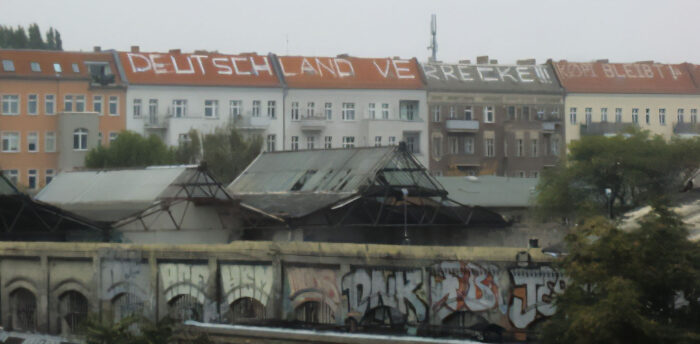
Graffiti on roofs in Germany: “Germany Croak!”
“The Bomber Saves Civilization” is the title of the first chapter in J. M. Spaight’s book Bombing Vindicated,[7] Spaight was the British Under-Secretary of State in the relevant ministry. He called the book an attempt to rehabilitate air warfare, not against the facts, but because of the facts. He firmly believed that, without aerial carpet bombing, civilization would have been destroyed in that war. The bomber is the savior of civilization.[8] The fact that the air war of World War II was started by Britain and was only answered by Germany after a delay of several months, has long been admitted by him and other British historians: J. M. Spaight wrote:
“We began to bomb objectives on the German mainland before the Germans began to bomb objectives on the British mainland. That is a historical fact which has been publicly admitted.”
He also admitted in 1944 that Hitler did not want the air war at all.[9] He called the decision for the bomber war “heroic” and compared it to Russia’s “heroic” decision for the scorched earth policy:[10]
“I gave Coventry and Birmingham, Sheffield and Southampton, the right to look Kief and Kharkov, Stalingrad and Sebastopol, in the face.”
Great Britain had also co-signed the Hague Land Warfare Convention of October 18, 1907; Article 25 states:
“It is forbidden to attack or shell undefended towns, villages, dwellings or buildings by whatever means.”
In their book The Fate of German Architecture during the War: Losses, Damage, Reconstruction, H. Beseler and N. Gutschow use 3,400 historical photos to demonstrate the historical buildings and urban ensembles that were destroyed during Allied air raids.[11] You could even read about this in the traditionally anti-German Munich daily newspaper Süddeutschen Zeitung:
“The photo comparisons with the state after reconstruction become aesthetic torture.”
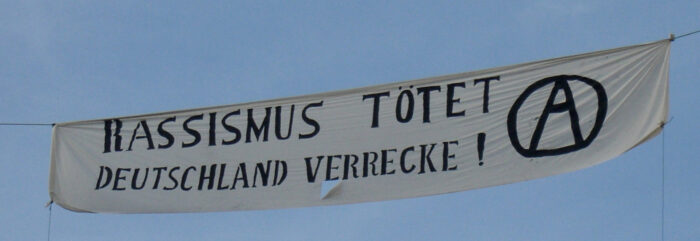
“Racism kills. Germany croak!” Antifa banner across a German street.
On the eve of the Second World War, Rudolf Bienenfeld characterized the mindset of non-religious Jews, in whom certain basic features of the Jewish religion continue to have an unconscious effect:[12]
“It [is] an unprovable article of faith that under no circumstances is it permissible to drop aerial bombs on an unarmed population, and it is another contrary but equally irrefutable article of faith that this is permissible if the dropping is useful to the prestige of the fatherland.”
These are said to be sentences on which the spiritual existence of a Jewish person is based, which he takes so much for granted that he would not be able to question them even if he wanted to, and which make any evidence to the contrary unacceptable to him.
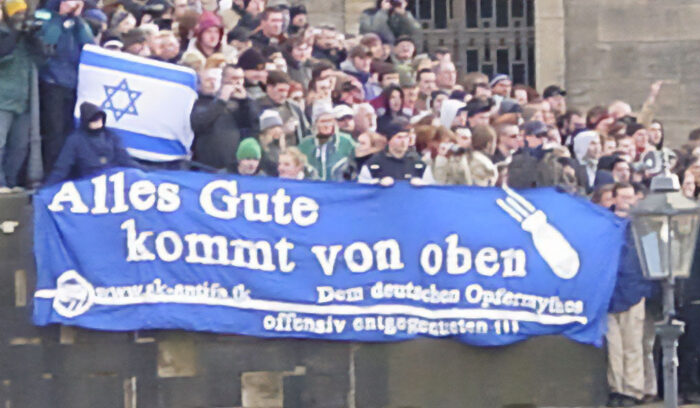
“Everything good comes from above” – meaning bombs. Demonstration in Germany against commemorating German war victims. Israeli flags waved as a sign of cultural domination and political occupation.
While we have learned to refrain from making sweeping judgments about certain population groups, the Bienenfeld gave this frank description of Jewish mentality in the form of a lecture to the Society for the Sociology and Anthropology of the Jews in Vienna on 10 November 1937, in which he thought it appropriate to point out that this was Friedrich Schiller’s birthday. Who would have thought at the time that two million tons of aerial bombs would soon be dropped on German cities and especially on working-class residential areas in order to benefit the prestige of other fatherlands – or even a state that did not yet exist?
“On May 10 [1940], the German army report announced for the first time that British airmen had dropped bombs on non-military targets in Freiburg and various places in the Ruhr area; since then, hardly a night has passed without these unplanned and indiscriminate bombing raids being repeated. On September 14, German radio announced that 26 churches and cathedrals had been more-or-less severely damaged. The losses of dead and injured German children as a result of these enemy air raids in the period from May 10 to August 31, 1940 amounted to: 79 dead, 29 seriously injured, 22 slightly injured.”
On the night of September 19, the Bodelschwingh Institutions in Bethel were bombed and partially destroyed by British planes. Eleven children and a nurse fell victim to the attack. The cemetery was also bombed.
“The most shocking thing is that England is doing all this under the slogan of being the defender of Christian world culture.”[13]
Even the “politically correct” German military historian Gerhard Schreiber cannot help but note:[14]
“As early as May 1940, when the British-French situation looked desperate, Royal Air Force Bomber Command had begun the strategic air war.”
According to Schreiber, the balance on the Allied side was as follows:
“By the end of the war, the bomber crews had flown 373,514 sorties against the Reich, some 1,383 of them before the end of April 1940. Their comrades from the 8th United States Army Force carried out a total of 332,904 sorties from August 1942 to May 1945. The British planes dropped around 970,000 tons of bombs, and the American planes 632,000 tons. […] Bomber Command lost more than 10,100 bombers and 50,000 crew members, while the 8th US Army Air Force suffered the same number of casualties, losing almost 5,500 aircraft.”

“Terror, hatred and demise for the German fatherland. Germany croak” – promotion(!) leaflet of the German extreme-left party “rat.”
And all this to “save civilization”!
“Remarkably, four-engine US bombers that dropped their deadly load over German cities were also named after Jewish gangsters. In addition to inscriptions such as ‘Murder Inc.’, these planes also bore honorary titles such as ‘Jake Greasy Thumb Guzik’ (from Al Capone’s gang), ‘Arthur Dutch Shultz Fliegenheimer’ (a serial killer), ‘Arnold Rothstein’ (according to the Jewish ‘Aufbau’, New York, of May 8, 1998, the ‘Moses of the underworld’ and ‘first drug king of the New World’), ‘Meyer Lansky’ (‘‘treasurer’ of the most important Chicago and Las Vegas gangs).”
So much for an addition to the subject of aerial bombs by Hartmut Stern.[15]
The American fighter pilot General Chuck Yeager reports on his mission at the time:[16]
“That fall [of 1944] our fighter squadron received an order from the 8th Air Fleet for maximum engagement. Our 75 Mustangs were assigned an area of 50 by 50 miles inside Germany and ordered to shoot at anything that moved. The intention was to demoralize the German population. […] We weren’t asked how we felt about shooting people down. It was a miserable, dirty business, but we all started on time and did it. It never occurred to anyone to refuse to join in.”
Peter Hichliffe was the navigator of a British Halifax group during the war and flew over fifty missions against Germany. In the foreword to his account of the merciless air war, The Other Battle, he writes about the German night fighters:[17]
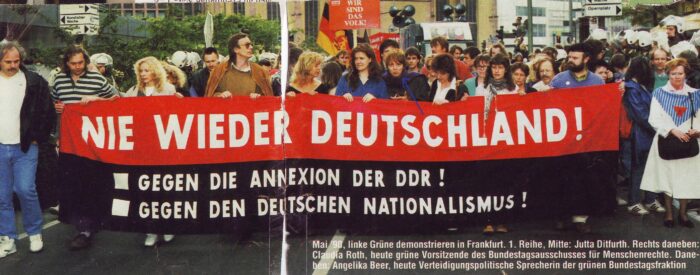
“Never again Germany!” – self-hating Germans demonstrate against the German reunification in 1990.
“They were very brave men. They saw the scout markers falling on their cities, they saw the terrible fires and firestorms and knew that thousands of their countrymen would now die a horrible death. […] They knew that every bomber they shot down was one less to drop explosive and phosphorus bombs the next time. But they also knew that death was waiting for them every time they took off. […] They flew until they were either dead, wounded or seriously injured after a crash landing.”
“Where is the German historian who would write something like this?” the reviewer remarks. It was only after the war, when the British occupying forces saw the extent of the destroyed cities, that they were horrified and filled with pity. Among the several thousand German night fighters, there was only one deserter, who was ultimately treated with contempt by the British.[18]
U.S. George F. Kennan confessed after the war:[19]
“By allowing the Russians to possess Königsberg and Vienna and Weimar, we have done the utmost to undo two thousand years of European history.”

Self-hating left-wing extremist German female asking to be turned into ashes, as her ancestors were during WWII – see the images left and right taken by U.S. troops after Germany’s “liberation.”
Harris, who proudly noted that his Bomber Command was destroying an average of two and a half cities a month in 1944,[20] said with a cynicism that could hardly be surpassed:[21]
“Again and again the Germans missed their chance to set fire to our cities.”
For every German ton of bombs on England, 315 tons of British bombs fell on Germany during the war,[22] and Telford Taylor, one of the American prosecutors at the Nuremberg Military Tribunal, later declared that he had excluded the bombing war during the Nuremberg trials because the German raids “paled in comparison” to the Allied ones.21
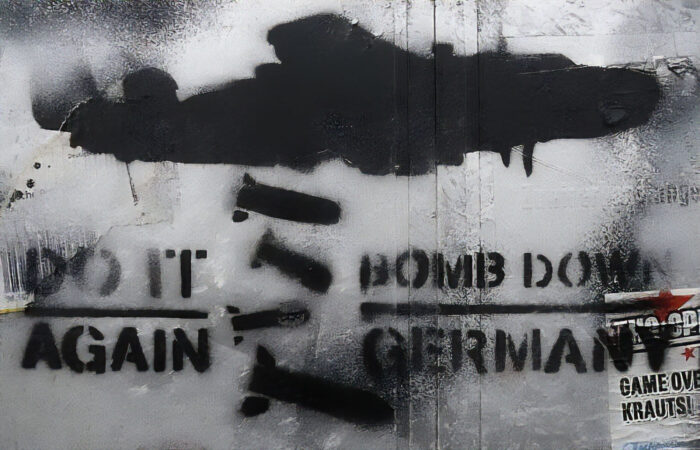
Graffiti in Germany
http://www.pi-news.net/2014/02/antifa-e-v-fordert-zwangsvergewaltigungen-von-volksdeutschen-frauen/
U.S. bombings of German cities was documented by Roosevelt in a photo book for Stalin. Svenska Dagbladet reported on the deployment of his Air Force on February 21, 1945:[23]
“The last heavy air raids on Dresden must have been one of the most terrible things to happen in this war. What had made Dresden a ‘pearl of art’ no longer exists. Some of the most beautiful and famous Baroque buildings now lie in ruins. […] Human bodies were torn apart, and in many places after the attack, you couldn’t set foot without stepping on corpses or parts of corpses. You could see dead people from whom the air pressure had torn every last piece of clothing. Corpses and body parts floated in the Elbe, and mutilated bodies lay wedged between the rubble. It seemed like a mercy when a layer of sand and ash had settled on the dead.”
The industry and the barracks in the north –the only targets of military value – were spared. However, the Allied bombing of towns and villages in allied countries, known today as “friendly bombing” or “collateral damage”, should not be forgotten in this context. To reinforce the German leadership’s misconception that the Allied landings would take place on the Pas-de-Calais coast and not in Normandy, Churchill did not hesitate to drop 200,000 tons of bombs on the Calais region to deceive them, costing the lives of 12,000 French civilians.[24]
Enthralled by Bombs from Head to Toe
Some people longed for the bombings. For example, Marlene Dietrich, who had emigrated to America, confessed to the Associated Press: “I am helping to sell bonds so that Berlin can be bombed,” where her mother and other relatives lived. Back in Germany in early 1945, she gave an interview to the New York Mirror:[25]
“I believe that Germany deserves everything that is happening to her now. And I urge the Russians to reach Berlin as soon as possible.”
On the tenth anniversary of her death, Marlene Dietrich was posthumously awarded honorary citizenship of Berlin.
The bonds to wipe out Berlin (“we want to blast the city of Berlin off the face of the map”) had been calculated by Treasury Secretary Henry Morgenthau Jr. in such a way that the cost to eradicate Berlin would be six times as much as for Hamburg. The total cost for flattening Hamburg had been $346,000,000, which meant that the cost for each of the 3.5 million inhabitants of Berlin, whether man, woman or child, was about $18.75. The bond cost $25 each.[26]
The air raid on Hamburg on July 28, 1943 was given the cover name “Operation Gomorrah”.[27] The survivors were later able to read in the Jewish Book of Books, also called “Holy Scripture” by Christians, provided it had not been burned:
“Then the Lord rained upon Sodom and upon Gomorrah brimstone and fire from the Lord out of heaven. And he overthrew those cities, and all the plain, and all the inhabitants of the cities, and that which grew upon the ground.” (Genesis 19,24f.)
Michael Degen’s mother had also wished for more bombs on Berlin at the time, as he reported in a Spiegel TV program on the bombing war.[28] The Jewish actor explained what happened:
“It was humane killing. You knew what you were dying for. In Auschwitz and in the gas chamber, you didn’t know that.”
When asked in 1988 which military achievement he admired the most, he replied: “None, none!”

“For more forced rapes of ethnic Germans. Still loving ethnic death. For the extermination of pure ethnic German genes!”
Lorenz Jäger from the German daily newspaper Frankfurter Allgemeine, born in 1951, who has a degree in sociology and a special interest in the writings of Walter Benjamin, said that the correct answer today should probably be: “The bombing of Dresden”.[29] He had better not show his face in Dresden in the near future. Jäger is obviously referring in all seriousness to the recently published “novel” Blondi by Michael Degen, and it’s not worth going into its muddled content. (Blondi was the name of Hitler’s German shepherd.) The Jewish journalist Henryk M. Broder has taken this upon himself and calls the work “the stupidest book of this fall” and Degen the “schmock of the week” on his homepage. Well, you don’t have to like him, after all, he says:[30]
“Philo-Semitism gets on my nerves.”
But what is a “schmock”? It’s a character from Gustav Freytag’s 1854 comedy Die Journalisten (The Journalists), which became synonymous with mindless, corrupt journalists. “I have written left, and right again. I can write in any direction,” says Schmock in the second scene of the play.[31] You are yourself a Schmock, one could say to Broder, as for this Jewish journalist, the best definition of anti-Semitism is the following:[32]
“Anti-Semitism is when you like the Jews even less than is natural as such. – This joke relegates most academic definitions to the realm of fortune-telling. It expresses what is important: anti-Semitism is not deviant behavior, not an exception to the rule, it is the normal case of social behavior towards Jews – the rule. In other words, it is not those who dislike Jews who behave differently from the norm, but those who have nothing against Jews.”
And:[33]
“The difference between an anti-Semite and a non-anti-Semite is that with a non-anti-Semite you just have to wait a little longer until he turns out to be an anti-Semite.”
And finally, Broder opines:[34]
“It’s quite possible that I’m paranoid. They can still come after me.”
After his return to West Germany, Theodor W. Adorno led a social-science team that conducted group experiments to determine the reaction of the German population to the topic of “guilt”. One participant is quoted as saying:[35]
“I also accept my own being bombed at any time as atonement for the great guilt that has been done to innocent people.”
Another participant, a former Luftwaffe soldier, who recorded his impressions of the major attack on Dresden by the British and Americans in the spring of 1945, was more difficult, with the name of the city replaced by periods:
“I was in the air force and witnessed the major attack on … at close quarters. It was one hundred percent certain that the Americans knew that 250,000 to 300,000 refugees had been taken into the city that night and that there were about a million people inside the walls of …. The Americans came and set the whole city on fire at night. The population had no idea how to behave during a bombing raid. After the city was on fire and the population, who hadn’t been trained at all, fled, the second wave came and dropped explosive bombs. And during the day, several hundred American long-range fighters shot into the columns. And the next day, we heard that 250,000 people were killed in …”
Adorno interpreted the protocol under the title Guilt and Defense: The speaker wants to substantiate a thesis: There had been no military justification for the bombing of Dresden; the attack had been a war crime. He understands the statements as a defense against guilt and an easily transparent protective assertion. For Adorno, the fact that the air war often became a topic insinuates a stereotypical pattern.[36] But we also recognize, let us say, a not-untypical Jewish pattern of thought: reality not experienced by oneself is irrelevant, and interpretation is more important than reality. The interpreter stands uninvolved next to the events and only analyzes the psychological processes that are recognizable to him. Otto Weininger wrote about this:[37]
“What is Jewish is to blame others. Shifting the blame is called Judaism.”
Wolfgang Benz, an anti-Semitism researcher at the Technical University of Berlin, said that references to Dresden and other places were “a certain form of German snivelling, completely fixated on their own suffering.”[38] In addition to an almost bottomless emotional crudity, there is also the “stop thief” principle, because who would be more fixated on their own suffering than Jews themselves?
In 1943, Bertolt Brecht seemed to have identified with the deadly swarms of bombers in his safe Californian exile, thinking of a possible return to his hometown (his father had been the commercial director of the Haindl paper factory in Augsburg until his death in 1939; it was hit by British bombers in 1942):[39]
“The return
The father city, how can I find it?
Following the swarms of bombers
I come home.
Where does it lie? Where the monstrous
Mountains of smoke stand.
That in the fires there
It is there.
The father city, how will it receive me?
Before me come the bombers. Deadly swarms
Tell you of my return. Blazes of fire
Precede the son.”
The Pleasure of Guilt
Jewish philosopher Hannah Arendt said as early as 1946:[40]
“Morally speaking, it is just as wrong to feel guilty without having done anything in particular as it is to feel guiltless when one has actually committed something. I have always considered it the epitome of moral confusion that in post-war Germany those who were completely free of guilt assured each other and the whole world how guilty they felt.”
And Heinrich Blücher, communist, life partner and later Arendt’s husband, wrote to her in the same year:[41]
“As I have already told you, the whole question of guilt serves only as Christian hypocritical chatter, among the victors in order to serve themselves better, and among the vanquished in order to be able to continue to concern themselves exclusively with themselves. (Even if only for the purpose of self-enlightenment). In both cases, guilt serves to destroy responsibility.”
Germany suffered three quarters of a million air war casualties during the Second World War, Japan about half that number, and England 51,000.
Under the heading “Self-hatred as balm”, the Hungarian essayist László Földényi records his feelings when dealing with Germans:[42]
“The most characteristic trait of Germans is above all that of wanting to be un-German. […] Nowhere in Europe have I experienced such a degree of national discord. And nowhere did I encounter such a degree of self-hatred as in Germany. Paradoxically, this very hatred seems to have a balm-like effect on many.”
Prof. Löw comments on this:41
“Above all, those became confessors of whom everyone knew that in 1945 they could not yet be guilty according to general principles, such as those laid down in German criminal law (14 years of age and younger).”
U.S. historian and political scientist David P. Calleo writes in his book The German Problem Reconsidered:[43]
“Many German writers seem to find a kind of perverse pleasure in ascribing to their people a unique badness that sets them apart from the rest of humanity.”
Dr. Günter Zehm, German professor of philosophy, adds this:[44]
“Thus, via the detour of German self-hatred, one hopes to finally arrive at the great bust-up after all, in which one can burn the traditional living conditions, and ‘true socialism’ can finally emerge.”
While the 1980 song by the Hamburg punk group Slime “Germany must die so that we can live” (“Deutschland muss sterben, damit wir leben können”) was previously banned, it is now permitted following a ruling by the German Federal Constitutional Court on November 23, 2000. It is considered art in the sense of the constitutionally guaranteed freedom of art.[45] “De-Germanize everywhere and everything” was the motto of the Beneš Decrees to ethnically cleanse Czechoslovakia after the war of all Germans and anything German.[46] Even today, some in Germany are still de-Germanizing themselves in anticipatory obedience.
Monika Maron, on the other hand, daughter of a Polish-Jewish mother and an active German communist, openly admits today:[47]
“We are experiencing anti-German racism. All countries in the world allow themselves to insult Germans, and I sometimes wonder whether we are not completely crazy for not daring to defend ourselves.”
Let us return to the principle of Adolf Loos quoted at the beginning. For Michael Wolffsohn, German-Jewish professor of modern history at the University of the Federal Armed Forces in Neubiberg near Munich, you could say that Loos’s principle of destruction making everyone richer became reality in Germany after May 8, 1945:
“The phoenix of peace rose from the ashes of that day. Learning from the victory over Germany means learning to build peace, especially for and in the Middle East.”
That is, as the author said at the end of 2001:[48]
“War would currently be the only way for Israel to break the deadlock.”
The prophet Micah (4:13) already recommended this:
“Arise and thresh, O daughter of Zion: for I will make thine horn iron, and I will make thy hoofs brass: and thou shalt beat in pieces many people: and I will consecrate their gain unto the Lord, and their substance unto the Lord of the whole earth.”
Prof. Konrad Löw commented as follows:[49]
“The Old Testament is indeed apt to cause astonishment, even consternation. It is a sign of deep religiosity that the devout Jew holds these texts, this mirror, up to his eyes every day.”
The Jesuit priest Rupert Lay wrote:[50]
“Even the first state of Israel came about through naked terror. Its founding history is interesting here in that the second state of Israel also tried to legitimize itself with a word that Yahweh supposedly spoke to Joshua around 1230 BC: ‘now therefore arise, go over this Jordan, thou, and all this people, unto the land which I do give to them, even to the children of Israel. Every place that the sole of your foot shall tread upon, that have I given unto you, as I said unto Moses.’ (Josh. 1:2f.). […] After the ‘taking of the land,’ the distribution of the East and West Bank began. A country that, like Israel, was only created through naked violence and countless genocides, became a symbol of perpetual wars and abysmal hatred.”
The Racist
George Steiner, the well-known Jewish literary scholar, confessed at the 6th U.S.-Israeli Dialogue in Jerusalem in the summer of 1968:[51]
“The existence of Israel is not founded on logic. It has no ordinary legitimacy. There is neither in its establishment nor present scope any evident justice – though there may be an utter need and wondrous fulfillment.”
In his acceptance speech on the occasion of receiving the Ludwig Börne Prize at the end of May 2003, he repeated:[52]
“Israel is a pure miracle, a magically fulfilled dream from hell. It is the only safe haven for the Jew when things start up again somewhere. And it will start again!”
But why on earth will it start again? Let us remember the words of Avraham Burg of the Israeli Labor Party, the “man who taught the Swiss banks to tremble in fear”:[53]
“Let’s assume that one day there will be peace; then Jews and Israelis will have to ask themselves: Can we survive as Jews without an enemy? Can we survive without a Hitler who defines for us who we are?”
It is well known that so-called neo-Nazis in Germany are nowadays groomed by Germany’s so-called Office for the Protection of the Constitution, so that so-called anti-fascists have something to target. This way, they can “start again” at any time.
While Paul Spiegel said that the accusation that the Jews themselves were causing (so-called) anti-Semitism was “the worst insult to German Jews since 1945”,[54] the now deceased Jewish sociologist Alphons Silbermann openly admitted:[55]
“In general, it should never be overlooked that the suffering experienced by the Jews, whether physical, existential or spiritual, often stemmed from their own fault.”
According to Silbermann, this is a characteristic of the “Jewish spirit”. Earlier, we learned about a characteristic of non-religious Jews from Rudolf Bienenfeld. It seems as if Steiner wanted to confirm this when he proudly confesses:
“I belong to the highest race because we do not torture. […] Anyone who tortures, even if it is to survive, is less than human. This is and remains a categorical imperative for me.”
…only to continue in the same breath:52
“Precisely in order to survive in a fanatically hostile, hate-filled environment, Israel must now also torture and humiliate its neighbors, terribly humiliate them. It has to do it.”
At least since the end of the 17th Century, there have always been well-meaning plans and initiatives to create, or even give, the Jews their own homeland. Nahum Goldmann declared in the spring of 1947 at the Congress of Canadian Jews in Montreal:[56]
“The Jews could have had Uganda, Madagascar and other countries for the building of a Jewish ‘fatherland,’ but they simply wanted nothing but Palestine […]: because Palestine is the crossroads between Europe, Asia and Africa, because Palestine is the real center of world political power, the strategic center of world domination.”
Rabbi E. Schwartz of the American Neturei Karta movement, New York, explained in the world’s largest Jewish daily newspaper, The New York Times, why nothing came of all the plans:[57]
“Their [the Zionists’] interest was not to save the Jews, on the contrary, more spilling of Jewish blood would strengthen their demand of the nations for the creation of their state. Their motto was Rak B’Dam (only by blood will we get the land). […] Zionist politicians and their fellow travellers do not speak for the Jewish people, the name Israel has been stolen by them. Indeed, the Zionist conspiracy against Jewish tradition and law makes Zionism and all its activities and entities the greatest enemy of the Jewish people.”
Therefore, this is the Israeli version of the “blood & soil” ideology that entails humane killing. In 1997, Rafael Seligmann declared Hitler to be the man of this century to whom the state of Israel owes its existence.[58] And Nahum Goldmann advised us a quarter of already a century ago:[59]
“One may reflect on the significance of the fact that it took two world wars, the first to induce England to proclaim the Balfour Declaration, the second to bring the United Nations to the decision to create a Jewish state in part of Palestine.”
In the spring of 1944, Martin Buber published this indictment in Jerusalem:[60]
“There are parties [in Zionism] that need a boiling popular soul to simmer their brew. Their best chance, and sometimes their only chance, is to radicalize the situation. They are prepared to sacrifice the rescue [of people] for this opportunity. […] And this is where the horror really happens: the exploitation of our catastrophe. What determines this is no longer the will to save, but the will to exploit.”
The Washington Observer let another cat out of the bag in 1969:[61]
“Most people think the purpose of the so-called Zionist movement is to establish a homeland for refugee Jews in Palestine – not at all. The real purpose of Zionism is to establish totalitarian global control via a World Supergovernment.”
Long before the founding of the state, the writer and professor of social philosophy Jean Izoulet wrote:[62]
“If Israel aspires to world domination, this is its right.”
And Romain Rolland noted in his Diaries a statement made by Maximilian Harden during the First World War:[63]
“Away with hypocrisy, we want power and world domination, and our power is our right. We no longer want to lie about our peacefulness, we are belligerent and want struggle and power.”
Steiner, who himself confessed to having squandered his energies and wasted them as a result, said:[64]
“I cannot cope with the issues that move me most deeply.”
Should we disagree? As if in mockery, he said:[51]
“How lucky you are if you can also be a guest of truth.”
Yes – if!
Endnotes
| [1] | Acc. to Alexander von Senger: Mord an Apollo; Nachdruck im Kultur-Verlag, Viöl 1992, p. 80. |
| [2] | Acc. to Brandfackel Moskau, Kaufhaus-Verlag, Zurzach 1931; quoted in Alexander von Senger, Mord an Apollo, ibid., p. 61. |
| [3] | The Fire: The Bombing of Germany, 1940-1945, Columbia University Press, New York, 2006. |
| [4] | https://en.wikipedia.org/wiki/MV_Wilhelm_Gustloff |
| [5] | Acc. to Grabert-Verlag’s newsletter Euro-Kurier, 2/2001. |
| [6] | Christoph Kucklick, „Feuersturm”: Der Bombenkrieg: Hamburg 1943; in: GEO 02/2003, p. 164. |
| [7] | Geoffrey Bles, London 1944. |
| [8] | Ibid., p. 7. |
| [9] | Ibid., pp. 68/47. |
| [10] | Ibid., p. 74. |
| [11] | Kriegsschicksale Deutscher Architektur – Verluste, Schäden, Wiederaufbau Wachholtz, Neumünster, 1988. |
| [12] | Die Religion der religionslosen Juden, 1939; 2nd ed., Wilhelm Frick, Vienna 1955, p. 13. |
| [13] | Junge Kirche – Halbmonatsschrift für reformatorisches Christentum, Issue 19, 1 October 1940. |
| [14] | Der Zweite Weltkrieg, C. H. Beck, Munich 2002, p. 48. |
| [15] | Jüdische Kriegserklärungen an Deutschland: Wortlaut, Vorgeschichte, Folgen; FZ Verlag, 2nd ed., Munich 2000, p. 254; see also Helmut Schröcke, Kriegsursachen und Kriegsschuld des Zweiten Weltkrieges, 2nd ed., Verlag für ganzheitliche Forschung, Viöl 2000, pp. 129ff. |
| [16] | Chuck Yeager: An Autobiography, pp. 79f., acc. to Frankfurter Allgemeine reader Prof. Dr. Gerhard Martin: “Jagdflieger-Erinnerungen” in: Frankfurter Allgemeine, 18 March 2002, p. 8. |
| [17] | Airlife Publ., Shrewsbury 1996. |
| [18] | Acc. to Peter Spodens Besprechung “Tapfere Männer” in: Frankfurter Allgemeine, 26. Juni 1996. |
| [19] | Mensch und Maß, Isssue 13, 9 July 2002, p. 599. |
| [20] | Christoph Kucklick, Terror gegen den Terror?, p. 123. |
| [21] | Ibid., p. 130. |
| [22] | Ibid., p. 138. |
| [23] | Acc. to Alfred Schickel, “Die Wiederkehr des Totalitären oder Vom Nutzen umfassender Geschichtskenntnisse”, Manuskript. |
| [24] | Dominique Venner: “Churchill contre Hitler” in: Enquête sur l’Histoire, No. 25, March-April 1998; here acc. to Philippe Gautier, Deutschenangst – Deutschenhaß – Entstehung, Hintergründe, Auswirkungen, Grabert, Tübingen 1999, p. 279, to give only one example. |
| [25] | Acc. to Rolf Helfert, “Ich bin von Kopf bis Fuß auf Liebe eingestellt…” in: Das Ostpreußenblatt, 16 Dec. 2000, p. 4. |
| [26] | “Ausradieren zum günstigsten Preis” in: Frankfurter Allgemeine, 29 January 2003, p. N3. The math doesn’t work, though. $346,000,000 × 6 = $2076,000,000: Divided by the 4.5 million pre-war inhabitants results in $461, not 18.75. |
| [27] | Read the report by GEO editor Christoph Kucklick, “Feuersturm” in: GEO 2/2003, pp. 140ff. |
| [28] | 1 March 2003, 21:55. |
| [29] | “Treffer” in: Frankfurter Allgemeine, 1 March 2003, p. 33. |
| [30] | Wochenzeitung für Politik, Kultur, Religion und jüdisches Leben, Berlin, 3 March 2003 / 29 Adar 5763. |
| [31] | Udo Leuschner: Der Schmock, Internet. |
| [32] | Der Ewige Antisemit: Über Sinn und Funktion eines beständigen Gefühls; Fischer Taschenbuch, Frankfurt on Main 1986, p. 30. |
| [33] | Ibid., p. 112. |
| [34] | Ibid., p. 288. |
| [35] | Lorenz Jäger, “Über Schuld und Schuldarten” in: Frankfurter Allgemeine, 4 July 2001, p. N 5. |
| [36] | Lorenz Jäger, “Adorno über Dresden: Bomben und Interpretationen” in: Frankfurter Allgemeine, 24 September 2001, p. 55. |
| [37] | Über die letzten Dinge; Vienna 1904; more recent: Matthes & Seitz, Munich 1980, p. 195. |
| [38] | Quoted in Lachenmaier, Zeitgeschichte wider den Zeitgeist: Alte Soldaten klagen die ganze Wahrheit ein; 2nd ed., self-published, Schwäbisch Gmünd 1996, p. 6. |
| [39] | Werke: Große kommentierte Berliner und Frankfurter Ausgabe, Vol. 12: Gedichte 2; Suhrkamp, Frankfurt on Main 1988, acc. to “Frankfurter Anthologie” in: Frankfurter Allgemeine, 6 October 2001, p. IV. |
| [40] | “Die persönliche Verantwortung unter der Diktatur” in: Konkret, Issue 6, 1991, p. 38; acc. to Antonia Grunenberg: Die Lust an der Schuld: Von der Macht der Vergangenheit über die Gegenwart; Rowohlt, Berlin 2001, p. 106. |
| [41] | In: Hannah Arendt – Heinrich Blücher: Briefe 1936-1968, Munich/Zürich 1996, p. 146; acc. to Antonia Grunenberg, ibid., p. 106. |
| [42] | Frankfurter Allgemeine, 14 January 1998; here quoted acc. to Konrad Löw, Die Schuld: Christen und Juden im Urteil der Nationalsozialisten und der Gegenwart; Ingo Resch, Gräfelfing 2002, p. 282. |
| [43] | Quoted by and retranslated from Rudolf Czernin, Das Ende der Tabus: Aufbruch in der Zeitgeschichte; 5th. ed., Leopold Stocker, Graz/Stuttgart 2001, p. 13. |
| [44] | Die Welt, 24 November 1986. |
| [45] | Holger Stark, “‘Deutschland muß sterben’ – ganz legal” in: Der Tagesspiegel, 24 November 2000. |
| [46] | Frankfurter Allgemeine, 20 April 2002, p. 8. |
| [47] | Die Woche, 29 September 2000, p. 41. |
| [48] | “Nur Krieg bringt in Nahost Frieden” in: Die Welt, 4 December 2001, p. 7. |
| [49] | Im heiligen Jahr der Vergebung: Wider Tabu und Verteufelung der Juden, A. Fromm, Osnabrück 1991, p. 113. The “holy year of forgiveness”, the fiftieth post festum, is long gone, and it’s only getting worse! |
| [50] | Die Macht der Unmoral: Sind wir alle käuflich?; Econ, Düsseldorf 1996, pp. 102f. |
| [51] | Acc. to Alfred M. Lilienthal, The Zionist Connection: What Price Peace?; Dodd, Mead, New York 1978, p. 731. |
| [52] | “Wir alle sind Gäste des Lebens und der Wahrheit” in: Frankfurter Allgemeine, 31 May 2003, p. 39. |
| [53] | Die Weltwoche, No. 5/30, January 1997, p. 3. |
| [54] | “FDP distanziert sich von Möllemanns Äußerungen” in: Frankfurter Allgemeine, 1 June 2002, p. 1. |
| [55] | Was ist jüdischer Geist? Zur Identität der Juden; Interfrom, Zürich 1984, pp. 114f. |
| [56] | Zitiert in Wolfgang Eggert, Israels Geheim: Vatikan als Vollstrecker biblischer Prophetie; Beim Propheten!, Munich 2001, Vol. 3, p. 334. |
| [57] | As part of a series of advertisements in the New York Times, 18 May 1999. |
| [58] | tz, Munich, 18 September 1997. |
| [59] | Israel muß umdenken: Die Lage der Juden 1976; Rowohlt, Reinbek 1976, p. 15. |
| [60] | William S. Schlamm, Wer ist Jude? Seewald, Stuttgart-Degerloch 1964, p. 173. |
| [61] | 15 December 1969. |
| [62] | Paris, Hauptstadt der Religionen oder die Mission Israels; Leipzig 1927, p. 49; acc. to Ingo Goldberg: Der jüdische Messianismus, Anton A. Schmid, Durach 1995, p. 29. |
| [63] | Tagebücher, p. 163, quoted in F. W. Foerster: Die jüdische Frage; Herder, Freiburg 1959, p. 52. |
| [64] | Joschka Fischer, “Unentbehrliches Wunder, kummervolles Mirakel” in: Frankfurter Allgemeine, 27 May 2003, p. 40. |
Bibliographic information about this document: Inconvenient History, 2022, Vol. 14, No. 3; first published in German as “Humanes Töten” in: Vierteljahreshefte für freie Geschichtsforschung, Vol. 7, Nos. 3&4, 2003, pp. 392-398.
Other contributors to this document:
Editor’s comments:
